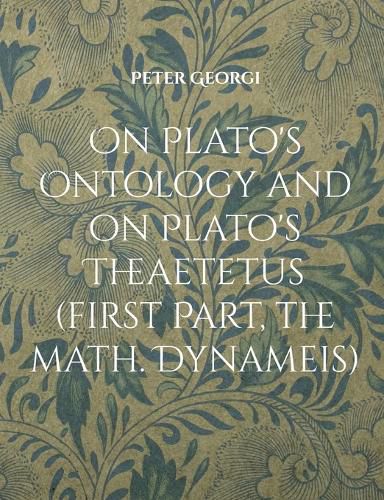Readings Newsletter
Become a Readings Member to make your shopping experience even easier.
Sign in or sign up for free!
You’re not far away from qualifying for FREE standard shipping within Australia
You’ve qualified for FREE standard shipping within Australia
The cart is loading…






This title is printed to order. This book may have been self-published. If so, we cannot guarantee the quality of the content. In the main most books will have gone through the editing process however some may not. We therefore suggest that you be aware of this before ordering this book. If in doubt check either the author or publisher’s details as we are unable to accept any returns unless they are faulty. Please contact us if you have any questions.
The Ontology part of the book is shown first in the title because of its more general, weightier meaning; but it has emerged from the Theaetetus part and is thus found after it. Both parts of the book can be read largely independently of each other. On the Theaetetus part: The dialogue Theaetetus is dedicated to the question: Knowledge - what is it actually? In the dialogue, it is problematized how in principle a 'general concept', thus also the concept of knowledge, can be determined. In the process, the 'famous' dynamis passage plays an essential role. To the passage substantial new issues are shown. In addition, there is a new perspective on the attempts in the initial dialogue part to determine what knowledge is. On the Ontology part: Here, starting from the dialogue Phaedo, a model of Plato's ontology is developed with provided means of mathematical logic. The model, in particular his determination of concept, enables (to the author's knowledge) a partially new understanding of Plato's so-called theory of ideas.
$9.00 standard shipping within Australia
FREE standard shipping within Australia for orders over $100.00
Express & International shipping calculated at checkout
This title is printed to order. This book may have been self-published. If so, we cannot guarantee the quality of the content. In the main most books will have gone through the editing process however some may not. We therefore suggest that you be aware of this before ordering this book. If in doubt check either the author or publisher’s details as we are unable to accept any returns unless they are faulty. Please contact us if you have any questions.
The Ontology part of the book is shown first in the title because of its more general, weightier meaning; but it has emerged from the Theaetetus part and is thus found after it. Both parts of the book can be read largely independently of each other. On the Theaetetus part: The dialogue Theaetetus is dedicated to the question: Knowledge - what is it actually? In the dialogue, it is problematized how in principle a 'general concept', thus also the concept of knowledge, can be determined. In the process, the 'famous' dynamis passage plays an essential role. To the passage substantial new issues are shown. In addition, there is a new perspective on the attempts in the initial dialogue part to determine what knowledge is. On the Ontology part: Here, starting from the dialogue Phaedo, a model of Plato's ontology is developed with provided means of mathematical logic. The model, in particular his determination of concept, enables (to the author's knowledge) a partially new understanding of Plato's so-called theory of ideas.